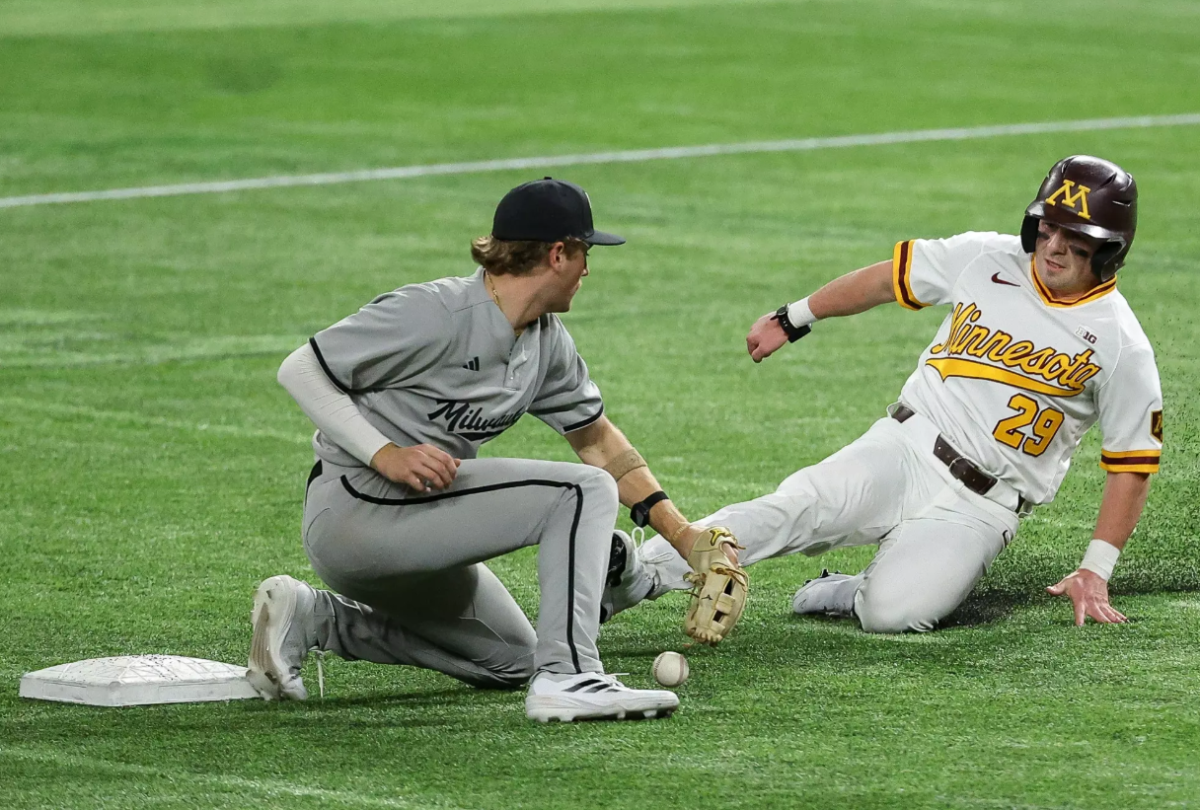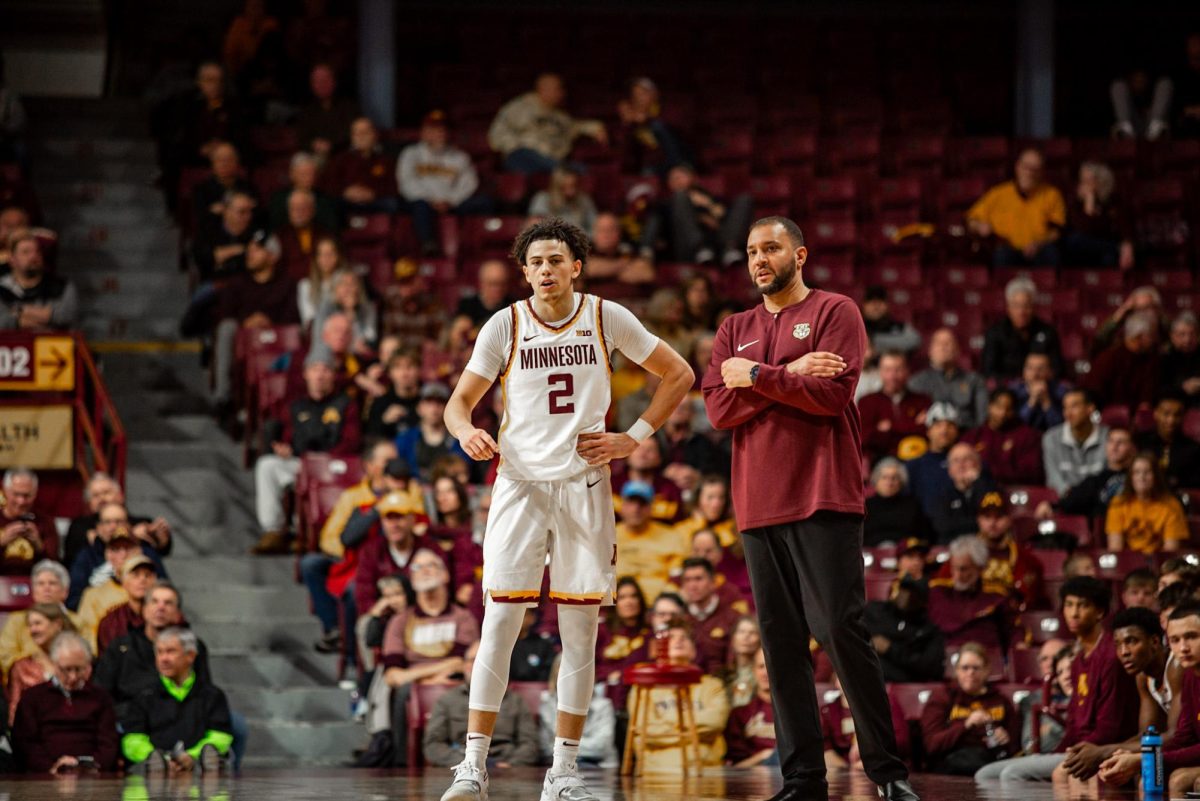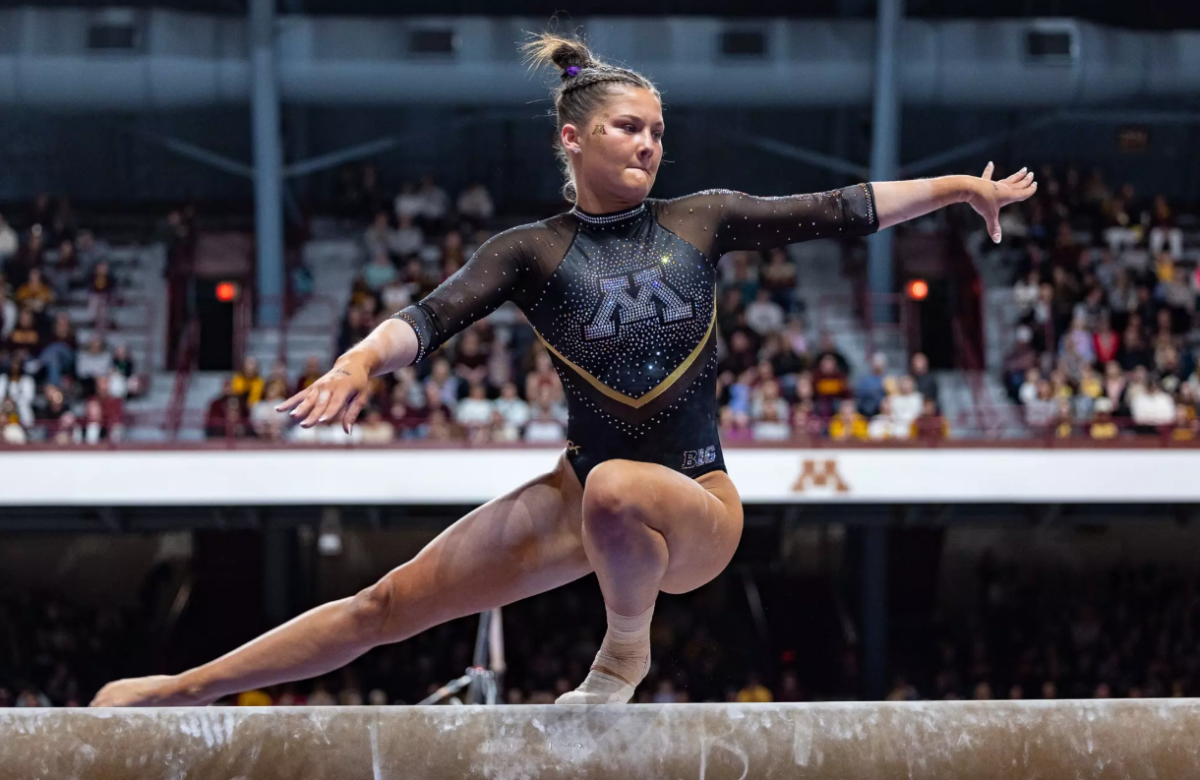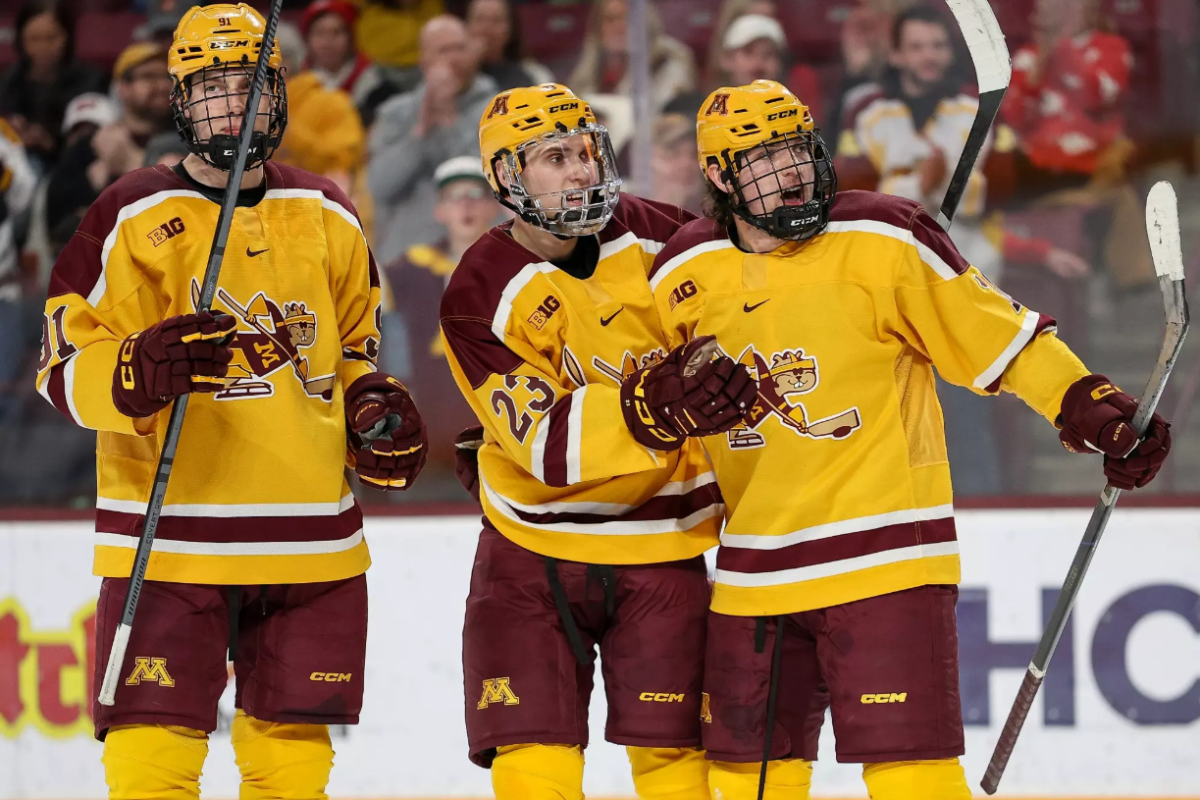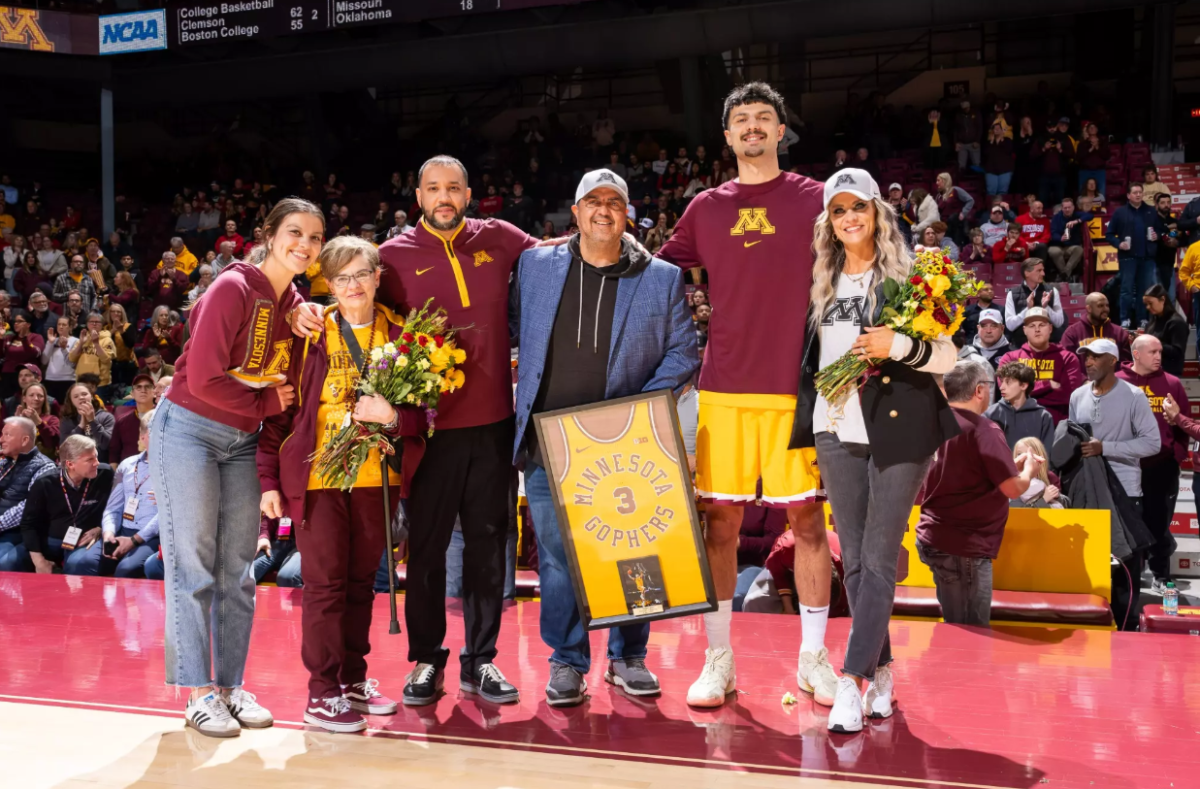Minnesota baseball coach John Anderson attended Paul Molitor’s Hall of Fame Induction on Sunday, as a representative for the Minnesota baseball program and the entire University.
But Anderson said he was also there for another reason.
“I was (Molitor’s) guest,” Anderson said. “It was pretty humbling because he had so many people he could invite. He’s got a lot of extended family, so I didn’t expect him to do that for me.”
To understand why Molitor’s induction was special to Minnesota, one must only look to the right field fence at Siebert Field.
Molitor is one of three former Gophers with his number retired.
The 2004 induction also gave Minnesota its second Hall of Famer – more than any other Big Ten school.
For these reasons alone, Anderson would have made the trek to New York last weekend.
But instead of getting lost in the shuffle of spectators, Anderson found himself in the middle of everything. He was rubbing shoulders with most of the past Hall of Fame inductees at a private party on Saturday night.
“It was pretty emotional to tell you the truth,” Anderson said. “There I was standing next to guys that I grew up watching, and I could just go up and talk to them.”
Starting something big Anderson’s prestigious invitation from Molitor was no mistake or unpaid favor.
The two have been linked from their first days as freshmen working out for the Minnesota baseball team.
While they were working out, Anderson said he realized Molitor was the best player he had ever been on the field with.
“It was pretty evident that he was a special player and I actually was wondering, ‘What is he doing here? He should be at the next level,'” Anderson said.
Although they didn’t spend a lot of time together during those first years, Anderson said Molitor helped steer him into coaching – even if Molitor had no idea.
“I was a pitcher and trying to make the team as a walk on, and I thought, ‘If I have to get this guy out I better get serious about my degree, because my career is going to be over very quickly.’ “
When Anderson began to suffer from arm trouble a short time later, he realized his playing chances were over with the Gophers.
Instead of leaving the team, Anderson heeded the request of legendary Gophers’ coach Dick “Chief” Siebert, and stayed with the team as a student assistant.
Then, in 1977, Molitor and the Gophers adopted a team attitude, which emphasized unity over individual accomplishments. The team concept helped them advance to the College World Series, which Minnesota hasn’t done since.
That year the Gophers voted Anderson the Most Valuable Player in keeping with their team concept.
“They didn’t want to pick any one player,” Anderson said. “I think they recognized that I did some things on a day-to-day basis, so I was a logical choice.”
Keeping connected
In his induction speech, Molitor acknowledged the value of his time spent at Minnesota.
“Dick (Siebert) was a stickler for fundamentals and when you practice indoors for two months in the winter time you get pretty good at them,” Molitor said.
After the Milwaukee Brewers drafted Molitor in 1977, he quickly made his fundamental base apparent.
In 1982 he had a breakout year, and helped the Brewers to a World Series appearance.
At the same time, Anderson was adopting Siebert’s fundamental coaching methods, and in 1982 he took over as the head coach at Minnesota.
In spite of skeptics, leery of his playing experience, Anderson said Molitor stood up and endorsed his new position.
“That meant a lot to me that he respected the fact that I was named the head coach,” Anderson said. “That gave me a lot of confidence that I could do the job at Minnesota.”
After the endorsement, the two stayed in contact sporadically throughout Molitor’s career. But no matter what, Anderson said they always knew what the other was up to.
Anderson recalled contacting him during his World Series runs with Milwaukee and again with Toronto in 1993 – when Molitor earned the MVP.
Despite all the good news and well-wishes the two shared over the years, Anderson said he still regrets one message he sent to Molitor in 1987.
Although he watched Molitor’s 39-game hitting streak from afar throughout the season, Anderson felt compelled to send a telegram wishing him luck before his game on Aug. 25, 1987.
“That night of course he went 0-for-4,” Anderson said. “I felt like I was the jinx. I shouldn’t have sent him that telegram.”
Despite Anderson’s concern about superstitions, the two continued to talk throughout the rest of Molitor’s career.
Then on May 12, 2002, Molitor repaid the favor, but he kept quiet.
On that day Anderson sought his 755th career win, which would move him past Siebert on the Minnesota wins list.
Molitor showed up in the stands that day and watched quietly as Anderson set the record and celebrated with his team.
After the game, Anderson received a call from Molitor on his way to celebrate with family and friends.
Then during the meal, Molitor surprised Anderson with a bottle of champagne and a hand-written note.
“I almost fell off my chair,” Anderson said. “It just speaks volumes about him.”
Leading the way
From his retirement in 1998 until he left to help coach batters in Seattle earlier this year, Molitor has offered his services to Minnesota in nearly every way possible.
Anderson said he served as a base running coach, stadium backer, financial supporter and just about anything else that was asked of him.
Athletics Director Joel Maturi said his impact has reached beyond the baseball program.
“Paul is one of those athletes who have always appreciated his roots,” Maturi said. “He has supported us not just in a financial way, but with everything that can help make Minnesota a better place.”
Anderson said one simple way Molitor contributed came from being a leader and blazing a trail for others to follow.
In addition to endowing a scholarship in the early ’90s, Anderson said it was Molitor and former Gopher Terry Steinbach’s willingness to get on board with the pro-alumni baseball game that stood out the most.
“I said, ‘If you guys are willing to do it I think that the other guys will come,’ ” Anderson said. “They said, ‘Great let’s do it.’ And they’ve been the two guys that have been to every game.”
Anderson said he isn’t surprised by Molitor’s continued support for both he and the team, simply because he has seen the way he takes time for everyone.
“I’d always ask him, ‘Who do you say no to? Where does it end?'” Anderson said. “He said, ‘You know what? Someday nobody’s going to know who I am, so if I can make a difference in somebody’s life now, I will.’ “
After Molitor’s date in Cooperstown, he’ll probably be able to make a difference for years to come.


